
Over the years, Charles Hartley has shared glimpses of what was being printed in The Pioneer News in different months and years. This page includes what was taken from the January through October issues of 1918.
In the first issue of the newspaper published after the deadly train wreck in December, the editor found at least one positive thing related to the tragedy. He wrote, "Fortunately, however, the school here was about closed that week, and at least a dozen school children were spared from Chapeze, Clermont, and Bardstown Junction, who daily ride that train."
One of their classmates, Jimmy Morrison, was killed in the wreck. The paper described him as "one of the brightest and most popular students of the Freshman class."
His father Jackson Morrison, who was a deaf-mute, ran a shoe shop in Shepherdsville. A notice was printed in the paper that said, "To my many friends and customers, since the train wreck which took my dear son, James and the horror of it all, I find that I can no longer run my shoe shop in Shepherdsville, but will move it to my home near Bardstown Junction."
Sadly, microfilm of early newspapers is frequently blurred, or the original paper itself was damaged, making it impossible to make out what was printed. Such was the case of the obituary of James W. Stansbury who was also a victim of the train wreck. We can make out some parts of it, including this statement: "He leaves to mourn his loss a mother and father, a wife, three daughters, Ella, Jennie and Lounetta, one son Clarence, two brothers, Guss and Emmett, and two sisters, Mrs. John Lee, of Belmont, and Mrs. Richard Hays, of Illinois."
Another victim of the train wreck was the local Catholic priest, Father Eugene Bertello who had just recently been involved in establishing the St. Aloysius Church in Shepherdsville. Father Bertello, who was from Italy, was described as "one of the best loved church leaders ever sent to this country."
In related news, Arthur Burns and Mammie Ice were married in Jeffersonville. He was the oldest son of Will Burns; she was a daughter of Kate Ice, widow of Tom Ice. Kate was one of the victims of the train wreck.
Another marriage reported was that of Violetta Roby and Horrie Thompson. She was the oldest daughter of J. A. Roby of Leaches; He was the oldest son of Mrs. Lillie Thompson who formerly lived near Cedar Grove in Leaches.
Also, Ada Greenwell and Elmer B. Samuels were married in Jeffersonville. She was a daughter of W. R. Greenwell of Leaches, and a sister to Mrs. J. W. Barrall.
A list of public officials sworn in in January included State Representative S. G. Thornsberry, County Judge C. P. Bradbury, County Clerk Lindsay Ridgway, County Attorney T. C. Carroll, School Superintendent Ora L. Roby, Sheriff J. W. Croan, Deputies Burr Harris, Clarence Dawson, Henry Jones, and D. O. Gober, Jailer W. F. Monroe, Surveyor Charles G. Bridwell, Coroner Dr. Shafer, Assessors Bert Shepherd and Ike Mudd, and Magistrates R. H. Miller, W. T. Carrithers, Forest Weller, and J. C. Wooldridge.
Two local teachers, Irene Crutcher and Lula Cook were forced to leave their classrooms for a time when they were infected with measles.
The heavy snows that began in December continued into January with below zero temperatures. The paper reported on January 15th that 46 inches of snow had fallen since December 6th.
And the first Bullitt County native to lose his life in the war effort was Seaman Julian S. Bell who was killed when the fore-mast aboard the battleship Michigan broke in a terrible storm, taking the lives of Bell and five others.
The following boys played for Shepherdsville in a basketball game against St. X of Louisville: C. F. Troutman, Samuel Ridgway, Forrest Wolford, Roger Wigginton, Muir Funk, and Thomas Trunnell.
Much of the front page of the February 1st edition of the paper was dedicated to issues involving food rationing, brought on by our participation in the war effort.
The Hebron correspondent had numerous bits of news to share. Sam Williams was quite ill; Mr. Robards was worse than before; but Mrs. B. B. Johnson was getting better. Burke Williams was at the bedside of his father, S. B. Williams. The remains of Mrs. Martha Parrish were buried at Hebron; Rev. Combs preached the graveside sermon. The children of Will Becker and Floyd Jenkins had the measles, no small thing in those days.
A large crowd attended the funeral of Julian Bell, the first Bullitt County boy to lose his life because of the war.
The Belmont correspondent reported that Miss Frannie Compton spent several days with her sister, Mrs. Palmer Hodges near Hebron; that James Engle was improving after a serious attack of pneumonia; that Misses Hays and Jeffries, teachers at Belmont, had faced the blizzard and not missed school a day; and the Belmont community was shocked at the death of Mrs. Tillie Murray of Hebron, who had lived in Belmont for a number of years.
The Mt. Washington correspondent wrote that Everett Armstrong captured 136 catfish when he cut the ice on his pond so his stock could get water.
In the school news column, we learned that Howard Roby, a former teacher of Bullitt County, had been out west for several years, working as a surveyor. He was home for a time, visiting with his parents, Mr. and Mrs. Levy Roby of Belmont.
Professor J. H. Sanders announced that the Shepherdsville Normal class would begin on February 25th. How many of you know what a "Normal Class" was?
Lula Ashby, who graduated from S.H.S. in 1917, took a position as bookkeeper for G. W. Maraman & Sons.
James Cochran, father of Professor T. E. Cochran, died suddenly at his home near Zoneton.
Also, W. Blair Robards of Hebron died following severe problems with asthma and lung trouble. He left a wife to cherish his memory, the former Bettie Williams, and one brother, John D. Robards.
The Cedar Grove correspondent shared that C. E. Crenshaw had made a four horse sleigh and was hauling from Shepherdsville daily. Sleigh riding was the thing to do; just as Elbert Lutes and his family.
W. N. Simmons advertised that he had lost a Black Poland and China male hog weighing about 200 lbs. It had one white ear.
The Salt River correspondent shared that Howard Maraman was slowly improving. Howard was severely injured in the December 20, 1917 train wreck in Shepherdsville. A number of relatives and friends paid him visits; most went away disheartened at his condition.
Edward Owen sold a pair of three year old mules to Herman Williams for $285.
And John Peacock put a new phone in his home on the short line running into the Mt. Washington exchange. Anybody know his ring?
R. E. Lee's step-son Ira Wallace died at his home near Shepherdsville of tuberculosis. He was only 21 when he died. According to the paper, as a youth he sold the Louisville newspapers in town, and later worked as the night operator at the telephone exchange.
The Shepherdsville Normal Class began with the following participants: Edyth Clark, Edyth Howlett, Maggie Wise, Mollie Roby, Effie Johnson, Eula Funk, Georgia Whittinghill, Theodosia Westerfield, Bertha Wallace, Pearl Laswell, and one or two others, not named.
Dr. Roscoe I. Kerr bought a new auto. So did Sheriff Croan.
Dr. S. W. Johnson, a former Bullitt County boy, wrote a nice letter to the editor about his travels. According to the paper, Dr. Johnson was currently the mayor of Sullivan, Illinois.
The Salt River column reported that John Boes had moved to Leslie Masden's place, where Jimmie Greenwell lived, and Jimmie had moved to the place he bought from Wilfred Lee, just across the road.
Folks continued to visit with Howard Maraman as he tried to recuperate from his train wreck injuries. Among those who came to visit were Mrs. H. W. Weller, Ernest Hodge, John Buckman, and several of his Maraman kinfolk.
A variety of news was shared in the Personals column. For starters, and I quote, "Tom Hibbs thinks he is bigger than anyone just now." Not sure what that meant. Also, Miss Sue Pope and Miss Sallie B. spent a day shopping in the City. And John Nicholson, J. D. Moore, and J. T. Ferguson of Cupio spent a day in Shepherdsville.
In Mt. Washington news, we learned that Misses Elsie Reed and Mabel Chowning of Louisville spent time with their grandparents, Mr. and Mrs. Pate Wigginton over the weekend. Also, Mrs. Elizabeth Parrish, age 83, was dealing with what everyone hoped was a light attack of pneumonia.
Also in Mt. Washington, Marion Rouse, age 16, died from complications following an appendicitis operation. She was a daughter of Mr. and Mrs. Herman Rouse.
H. S. Porter of Bardstown Junction had a gray percheron horse for sale. It stood 17 hands high, was kind and gentle, and a good breeder.
In the Mt. Washington road community, Albert Fisher and his wife provided dinner for the following guests: Mr. and Mrs. Claude Owen, Mr. and Mrs. Pearl King, Mrs. Mary Fisher, Charles K. Fisher, Mrs. Elizabeth Owen, and Edward Owen and his family.
That columnist also reported that A. F. Owen had LaGrippe. This was another name for the so-called Spanish Flu that was reaching epidemic proportions in 1918.
With the war effort continuing, government administrators were setting prices that merchants could charge for various foodstuffs. Sugar was 10 cents a pound, potatoes were 15 lbs. for 55 cents, and navy beans were 20 cents a pound.
And George W. Maraman and sons, who owned the old American Hotel for some time, began tearing it down to put up a brick building on the site to use as an implement house and storage room.
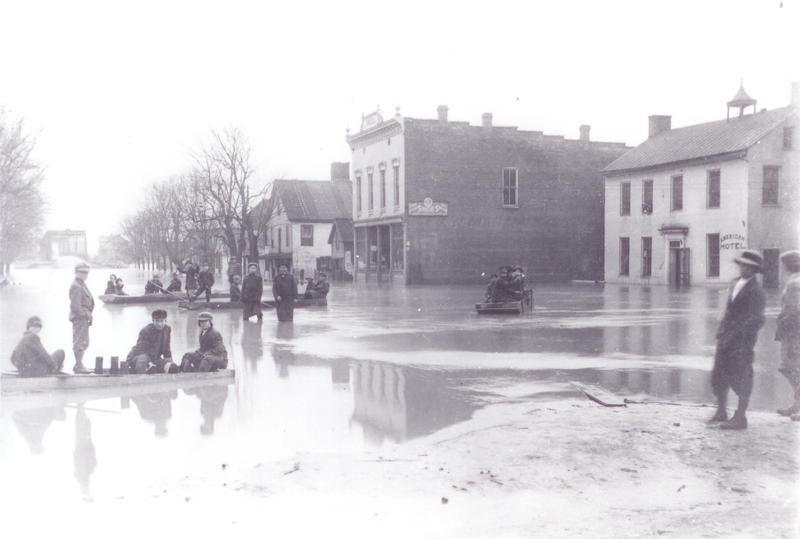
Misses Lillian Mooney and Lillian Thompson, teachers at Lebanon Junction, gave an ice cream social for the benefit of the Junior Red Cross members and made $22.85.
Wilbur Wickersham, son of Mr. and Mrs. John T. Wickersham of Lebanon Junction, lost his leg by being run down by a train there.
The April term of Bullitt Circuit Court began with the following members of the Grand Jury: L. L. Masden, Burks Williams, R. A. Stallings, W. P. Swearingen, Charles Applegate, Henry Trunnell, Ed Bridwell, Jess Buky, J. T. Carlisle, Alfred Stansbury, R. A. Collings, and W. F. Joyce.
Those selected to serve on petit juries included Owen Prather, Dave Crumbacker, J. T. Carrithers, Ollie Hall, Less Ryan, Tom Parrish, W. L. Gentry, George Jones, W. T. Hall, W. H. Buckman, L. L. Roby, S. O. Armstrong, Esquire Brooks, J. R. Howell, Claud Hill, T. L. Coakley, Fred Bogard, William Lee, J. F. Sarr, Jr., W. D. Ellaby, Lawrence Howlett, Ed S. Rhea, G. W. Collings, J. C. B. Hoagland, Peter Bleemel, J. W. Gabin, and R. M. Hardy.
A Circuit Court jury brought in a verdict against the railroad for $8,420. The previous grand jury had indicted the company for maintaining a common nuisance in the way their trains were operated through Shepherdsville, as demonstrated in the Dec. 20 train wreck. (The railroad would get this verdict overturned in appeals court later.)
In an advertisement for the Bullitt County Bank, its officers were named, including J. F. Combs (President), B. F. Pope (Vice-President), and H. H. Combs (Cashier). The bank had been established in 1889.
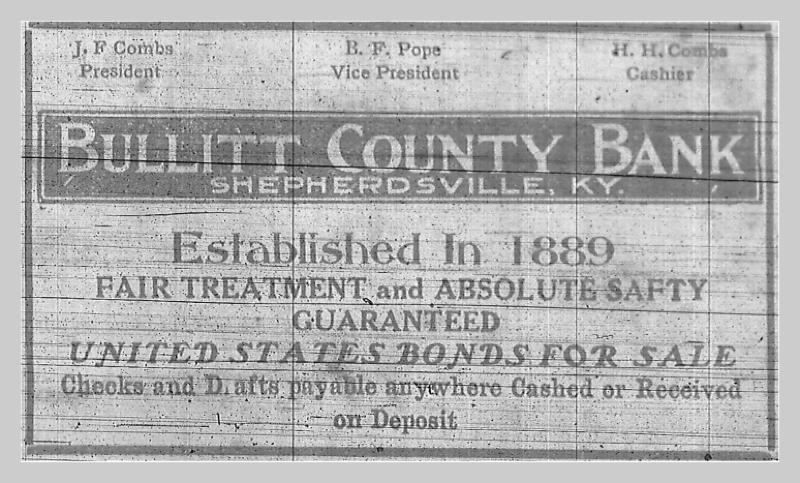
James Hardaway and County Attorney T. C. Carroll had taken two young ladies out for an auto drive one Sunday evening. As the paper put it, "Mr. Carroll stopped to let his friend out but Jim was so interested in looking at his girl that he just bumped into Tot's machine. Lucky no one was hurt, but the garage had to straighten out Tot's fenders."
Various local ministers were named in the church directory including Herbert Haywood, pastor of the Shepherdsville Baptist Church, Hillery D. Burns of Bullitt Lick Baptist, C. F. Allen from the Methodist Churches, Howard J. Burnette of the Christian Church, and Father McAleer of the Catholic Church.
From the Personals Column we learned that Willie Mae Ridgway took a ten day trip to Cincinnati and Falmouth; that Laura Summers of Bardstown was in town visiting her brother John Summers; that W. T. Morrow had returned home after spending the winter in Florida; and that James Ice and Charles Dawson left for a trip to Hot Springs.
And John McFarland of Kansas City, formerly of Mt. Washington, was in town. The paper described him this way: "John is just as full of fun and good stories as ever; looks just as handsome, dresses as tastefully, and talks just as interestingly. Knowing the courting game from end to end, he says he has done well in the wild and wooly west, and notwithstanding the passing of many years, feels that he can do a lot of sparking yet."
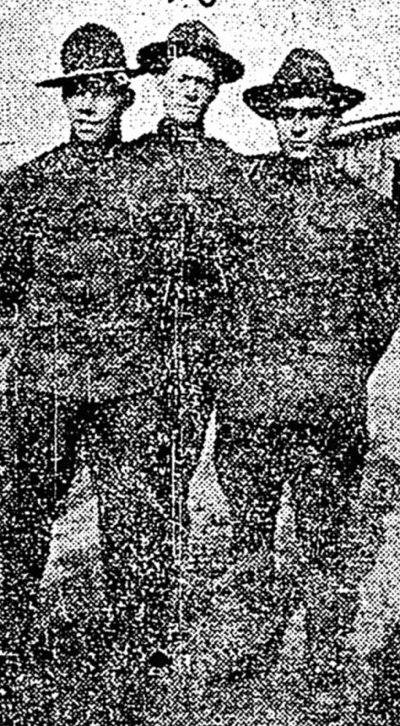
Mary Jane Trunnell, who was a substitute teacher for Bullitt County the past year, was offered a place in the Lebanon Junction Graded School for the coming year. Also, Lillian Thompson of Shepherdsville, and Amelia Lee Oaks and Lillian Mooney of Bardstown Junction, would be continuing to teach at Lebanon Junction.
An effort to raise funds to repair the Preston Street Pike brought out a number of supporters including Senator Zimmerman, Judge Bradbury, Prof. Charles Bridwell, J. C. Holsclaw, William Howlett, Tom Cochran, Dr. G. W. Kirk, Edward Tyler Jr, Robert Shanklin, H. A. Nusz, and W. G. Jenkins. They needed to raise $1500 to match an equal sum appropriated by Fiscal Court.
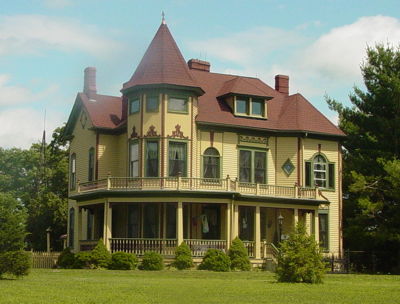
Irving D. Snellen sent the paper a photo of himself along with two fellow soldiers, Roger Hordman and Roy Applegate, taken in France. Irving was a son of Mr. and Mrs. R. D. Snellen of Brooks. Snellen was one of the first to enlist from Bullitt County.
The paper reported that Captain J. H. Linn, owner of Dingley Dell, had sold the property to J. Monroe Garr of Shelby County. (The Conways have restored that fine home to its former glory.)
The Hebron correspondent reported that Rev. Gordon of Hebron Presbyterian Church would be leaving. Rev. Gordon would graduate from the Presbyterian Seminary in Louisville later that month, and return to Mississippi.
Mrs. Harry Wells' dog was lost. He was black with a white face and a bob tail, and answered to the name "Mike."
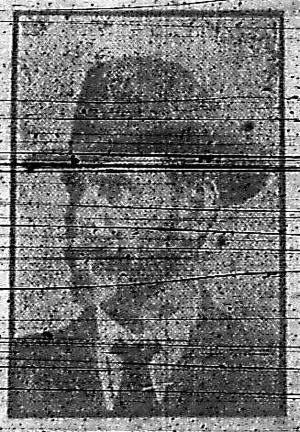
Hardy Cruise posted a notice to stockmen that Bruno Munson and Brown's Orphan Boy were available as sires.
Dr. David Smith, the local veterinarian, included a small photo in his newspaper advertisement.
The friends of J. R. Buckman were glad to know he had gone to work again and that he would have the largest crop of strawberries this year than he had ever had.
The editer reported, "Uncle Ben Crist was here one day the past week. The girls are always glad to see Uncle Ben."
The editor wanted to know, "Have you seen James Hardaway with his new auto? Jim spent one day last week in the city and said it was all he could do to keep the machine from running on the sidewalks."
C. C. Lee, whose farm was near the Wooldridge Ferry a few miles below Belmont, advertised for sale 18 head of dairy stock at public auction. The reason was that he couldn't find enough workers to keep them milked. James Roney was to be the auctioneer.
Misses Inez Kirk and Elizabeth Bailey attended the Presbyterial in Louisville, as delegates from Hebron Mission Band.
Mr. and Mrs. Bailey Taylor, and their eight months old son, Athol Lee, were visiting Mrs. Taylor's parents, Mr. and Mrs. J. B. Swearingen. The Taylors were living in Texas at the time.
And the paper reported, "Mr. and Mrs. Henry Trunnell were attending lodge when a man stole his horse and left. Jim Hardaway, Jailer Monroe, J. R. Zimmerman, and Henry Trunnell took a machine and started for Louisville. Near Camp Taylor, they came up on the horse and driver. At that time, a woman was in the buggy. They were arrested by Jailer Monroe and brought back to Shepherdsville and landed in jail where they would board in the rock mansion for a while."
In 1918, Bullitt County was dotted with small schools, and the paper reported the names of the already hired teachers for the fall term. They included Christina Skinner (Corinth), Willie Chickering (Highland), Margaret Hardesty (Chappell’s Ridge), Varina Mudd (Shades), Gussie Quick (Woodlawn), Alma Forrest (Bullitts Lick), Bertha Wallace (Mt Elmira), Nadine Melton (Hebron), Verna Funk (Brooks), Nellie M. Starks (Beech Grove), Mayme Stephens (Mt. Washington), Edyth Clark (Sugar Valley), N. H. Beeler (Edgewood), Ruby Monroe (Whitfield), E. Nora Bridwell (Glades), Edna Starks (Pleasant Hill), Alleen Swearingen (Cedar Grove), Mollie Roby (Victory), Ethel Wise (Woodsdale), Maggie Wise (Hobbs), Bertha Trunnell (Glen Ella), Mary Dawson (Pitts Point), Mary E. Bell (Beech Grove), Lillian Wiggington (Hays), Ida May Greenwell (Zion), Lillian Monroe (Cave Run), Mamie Smith (Harned), Elizabeth Cash (Mt. Carmel), Pearl Laswell (Culvert Springs), Willie May Ridgway (Oak Grove), Leona Johnson (Shepherdsville), Elsie M. Jackson (Mt. Washington), Louise Rankin (Bowman Valley), and Mary E. Jackson (Lebanon Junction).
This didn't include the main school in Shepherdsville, or the small schools at Mt. Olive, Nichols, Sunny Side, and Clermont. The latter four did not have teachers yet.
The paper reported, "We have been informed that the rifle range at West Point will be enlarged. The line will be up Salt River on the Bullitt County side to the Luke Hibbs place, then round by Mt. Eden and through to Knob Creek, near Cupio and then to West Point. This will take in a large part of the western part of the county. Some of the best farms lay in this tract and it will cause many families to have to move."
In April, field artillery units from Camp Taylor had arrived at West Point for training on 20,000 acres near Stithton. The above described addition added another 40,000 acres to what was becoming Camp Knox.
Even though the government had taken over management of the railroads during the war, accidents continued to occur. In June the L. & N. Flyer No. 7, that had been involved in the terrible December wreck, wrecked again, this time at Huber Station. Although many were badly hurt, no one died in this wreck.
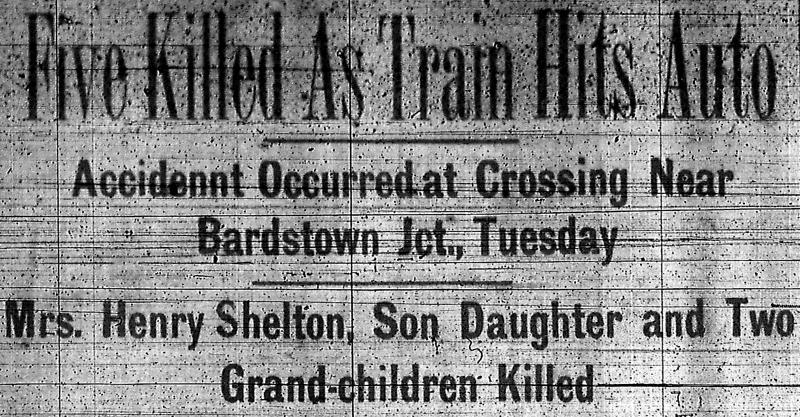
Then in the middle of June, five people died when their vehicle was hit by a speeding train at a railroad crossing just south of Bardstown Junction. Killed were Mrs. Henry Shelton, John H. Lee, Letitia Lee and her infant child, and the daughter of Mr. and Mrs. Lawrence Howlett.
Fires caused havoc in places with Pete Philpot's family barely escaping as fire destroyed their home. Then William Logsdon's store and home at Clermont burned down, and C. E. Wise of near Wooldridge Ferry lost his barn and outbuildings together with about 300 bushels of corn.
Christopher and Lula Schaefer received a letter from their son Sgt. Oscar Paul Schaefer who was stationed in France. According to the letter, he was well, and he mentioned that Golden Riley of Hobbs was there and well also.
The Schaefer's had lost another son, Thomas in the December train wreck, and surely treasured receiving word from Oscar. Sadly it may have been one of the last times they heard from him. Oscar was wounded in the fighting in France, and died of his wounds in September. He is buried in France.
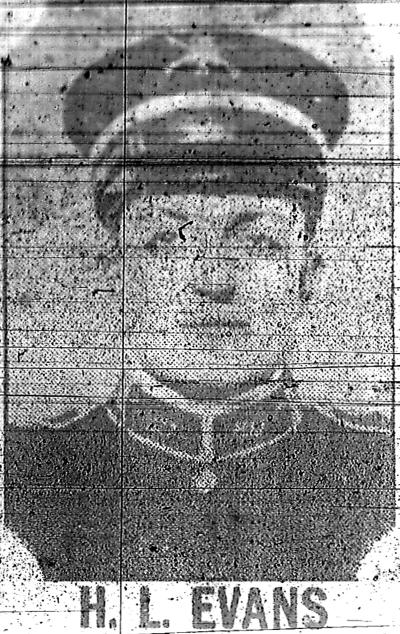
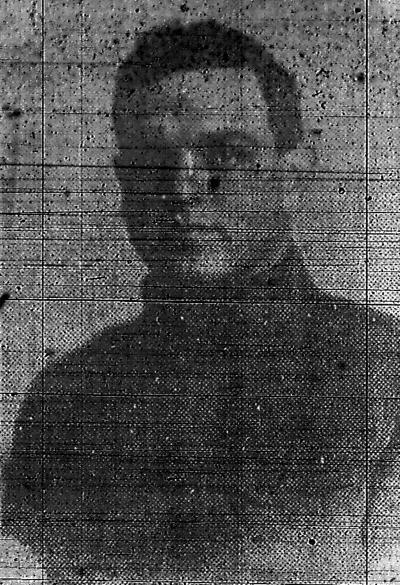
The first Bullitt County boy to die in France was Cpl. Herman L. Evans of Lebanon Junction.
Another local soldier was Charles Chester Longacre, a grandson of the late Silas F. Barrall. Longacre was pictured in the paper, and said to be somewhere in France. He survived the war, returned home and went to work for the railroad as a fireman. Then in 1927, at the age of 36, he died of a ruptured appendix.
It had been a difficult, terrible year for a lot of folks, and for many it would get worse before it got better. Among other difficulties to come would be the Spanish Influenza that would begin to arrive in September.
The war effort was on the minds of folks, as well as the fact that so many young draftees were unable to read and write.
The paper reported that there were more than four million illiterates over the age of 20 in the United States, including 700,000 men of drafting age.
It also reported that a local educator, Charles Hardesty, who had been inducted, was being held at Camp Taylor for some time teaching illiterate soldiers. It said, "The first regiment has 470 illiterates out of 3000 soldiers and these 470 will be taught, if possible, to read and write a letter back home before they are sent away from Camp Taylor."
Miss Verna Funk, a popular and well-known teacher at Brooks was quoted as saying, "I sincerely hope that the state and county officials can and will enforce the new school law for I am sick and tired of school children loafing around stores and depots."
Alex Smith enlisted in the Navy, although he was eleven pounds underweight. The paper said that he was "given credit for the experience gained climbing coon trees and cooning cat holes along Floyd's Fork, under Charlie Bridwell's instructions."
Mr. and Mrs. A. H. Settle, of Mt. Washington, received a card from their son, John Reubin Steele, telling them of his safe arrival over seas. He transferred into the 138 Field Artillery and was promoted to a First Class Gunman before sailing for France.
Mrs. Violetta Thompson received a letter from her husband in France. He stated he was well and would like to hear from the folks from Bullitt County. Any one wishing to write to him, address - Pvt. Horrie C. Thompson, Co. D, 120 Inf., 30 Division, AEF, France.
And Mrs. Ora L. Roby received a card from her brother, James Hilary Hardy, notifying her of the safe arrival of his ship overseas. That was welcome news, as many Bullitt County boys were members of his division and were supposed to have been on this ship.
In Mt. Eden news, Miss Margaret Hardesty had begun her school at Sunny Side; Mrs. Nannie Gross visited Mrs. M. J. Foster and family; Mrs. John Chambers, Miss Katherine and Mrs. Maggie Wise spent a day with Mrs. M. J. Foster; and Miss Gertrude Holsclaw returned home after spending some time with Mrs. Frank Goldsmith.
In the Cedar Creek area, Mr. and Mrs. Lem Swearingen and two daughters, Misses Alleen and Texia, and Miss Elizabeth Magruder spent Sunday with Mr. and Mrs. Jonce Clark. Also, The new church building which was being erected at Victory would soon be completed.
Mr. J. D. Buckman, who had been laid up for some time with small pox was out again.
In Mt. Elmira news, Ernest Gentry and Noah Ferguson called on Misses Hattie and Myrtle Klapper Sunday night; Mr. and Mrs. Charles Edwards and family were guests of Mr. J. D. Ferguson's family Sunday; and Uncle Sam called on Luther Martin, so he was going to help win this war.
And in lighter news, the paper's editor wrote, "My beloved fellow citizens of Bullitt County. Have you seen that lovely, invisible, downy, feathery, soft, silken mustache grown or being grown by young C. F. Troutman? If not, when you come to town, get a magnificent magnifying glass and take a look at it. Jim Hardaway caused it all. He began the cultivation of his dainty 'Chawlie' kimona for his upper lip just a few brief days since, and C.F., seeing how lovely it looked, could not resist the temptation to grow one of his own. Well, of course, it all comes and goes in a lifetime. Tom Martin hones his best razor every time he sees C. F."
In school news, the paper reported that Professor Charles Daniels, "one of our finest young men and a teacher here for the past few years," had accepted a job in the Fort Pierce, Florida schools. Before leaving, he spent a few days with his sister, Mrs. Vern Jones.
Trustee Bert King had the school house repaired and put in first-class condition at Corinth where Miss Christina Skinner was teaching and where a good school year was in progress.
Miss Bertha Wallace began her school Monday Aug. 5 at Mt. Elmira. Will Becker opened up his school at Edgewood, and Miss Mary Dawson started the Pitts Point school the same Monday.
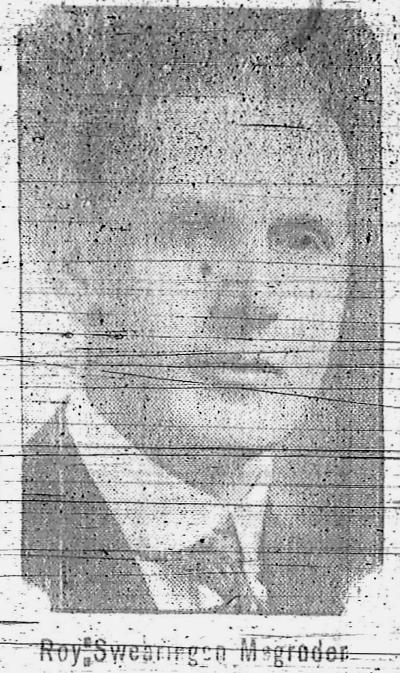
Miss Bessie Grant received a beautiful silk handkerchief as a souvenir of France from Hugo Crenshaw. She and Miss Myrtle Shaw and several others received letters from him in which he stated he was well and doing fine.
A photo of Roy Swearingen Magruder, son of Mr. and Mrs. S. B. Magruder, of Lebanon Junction, was in the paper. Word had been received of his safe arrival over seas with the 51st Infantry. He enlisted in the early part of May and was in training at Camp Forest, Georgia. After the war, he would later move to Texas and invest in the oil business.
There were a number of letters published in the paper from local soldiers to their friends and loved-ones including one from Horrie Thompson to his wife Violetta. They had been married the previous December while he was stationed at Camp Taylor. Now he was overseas, somewhere in France.
He closed his letter by saying "I want you to take good care of yourself and keep well for there is not a day passes by but what I think of you many times, and may God bless you in many ways until I return to you."
Horrie Columbus Thompson would die on the battlefield in September.
His brother Albert was stationed at Camp Beauregard in Louisiana when he wrote to his mother, Mrs. Lillie Thompson about his experiences on the rifle ranges. He would later be shipped to France as well.
In another letter to the paper, William G. McCormick wrote on behalf of himself and three others, James Hoagland, Herman Skinner, and Vesey Hatfield, all of whom were at Camp Merritt, New Jersey, waiting to be shipped out. The letter described their fine trip from the South to New Jersey and mentioned seeing the White House.
From somewhere in France, Irving D. Snellen wrote his brother, Ira Pleasant Snellen. Among his comments, he said, "I haven’t gone over the top, but know how a shell sounds as it goes over my head. I always heard that the first ones that you heard scared you worse than after you get used to them. That might be so, but it was not my experience. I didn’t know how to duck the first ones that bursted near me, but soon got in practice, Ha!Ha!"
And John Reuben Settle wrote to his mother, saying "Tomorrow is the Fourth of July, my second Fourth in the Army and though I cannot be with you, I will think of you often tomorrow." He indicated that he was somewhere in France, and described it this way: "France is also a very pretty place, where it has not been torn by the carnage of war and the people are as industrious as the English. The women work as hard as the men on the Rail Road, in the factories, and women and children work on the farms 16 and 12 hours a day and they never say a word for they know they are working for France and they love their country above everything on earth."
War was constantly on the minds of those back home who were receiving these letters.
More than 15,000 acres of land in Bullitt County adjoining the West Point Rifle Range would soon be taken over by the Government. It would cause more than 100 families to have to move. The line started at the Pond Creek Bridge, following the county road up Knob Creek to the Joe Vaughn Ford, then nearly straight to the Mt. Eden Church, then south to Salt River near the John Quick place and then down Salt River. Much of the land was Salt River bottoms and includes some of the best farms in Bullitt County. Much fruit and tobacco was raised on the hill land.
James Davis announced a public sale with this notice: "As the Government has taken over my land, I will sell to the best bidder at my place 5 miles West of Pitts Point, about 6 miles East of West Point on Salt River the following stock, farming implements, household and kitchen furniture." He would not be alone.
John Henry Warden wrote two letters home from Anniston, Alabama where he was stationed. In the first to his mother, Mrs. Ellen Warden, he wrote "Mamma, you see that Maggie and my baby are well cared for, for I may never get to see it again, but I believe I will."
To his wife, he wrote "Tell Beulah May when Papa comes home, he will sing some new songs for her."
John Henry did come home, and he and Maggie lived a full life with several childen on their Bullitt County farm.
During a thunderstorm, lightning struck one of the flues of Leslie Figg's dwelling house, the brick was crumbled and fell, some shingles were torn off. No one was hurt.
Mr. and Mrs. George Armstrong used their auto to take a bunch of chickens to market which brought something over $30.
Miss Lillian Pitman left for Rochester, New York, where she would enter college. She graduated from Shepherdsville High School, and had one year's experience in teaching school. Everybody wished her bon voyage, a successful term in college and safe return to her Old Kentucky Home.
Lt. Irvin Funk spent several days home before leaving for France.
The school at Mt. Washington opened with the following teachers: Prof. McGowan of Eminence, Ky, Principal, with Miss Ethel Wise and Nancy Trunnell as assistants.
This county had a visit from Prof. McHenry Rhoades, State High School Inspector for Kentucky. He reported the Shepherdsville High School as an "A" or first grade, which was the greatest honor ever yet brought to Bullitt County.
Mr. Fred Rush, the popular butcher, bought a bunch of fine cattle and would have extra choice beef for his many customers for several weeks. He was a fine butcher and had a clean and up-to-date meat shop.
J. F. Combs, food administrator for the county, announced that the allotment of sugar to the State of Kentucky for canning and preserving purposes was increased. Every family was entitled to twenty-five pounds.
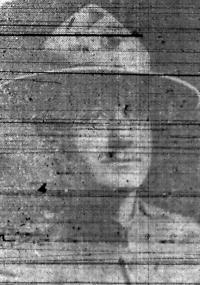
Mrs. Lora Lee Bates and daughter, Miss Evelyn, left for New York, where they would join Dr. S. W. Bates, who was to be stationed there for several months.
Mrs. Maria Foster moved into the S. W. Bates house, on the corner of Main and Water Street, and resumed the keeping of boarders, regular and transient.
And the paper wrote, "This is a good likeness of our esteemed townsman, Millard Troutman, eldest son of Mr. and Mrs. C. F. Troutman. Millard entered the Service in January of this year and was sent over in April. He has been 'Over the Top' several times and writes enthusiastically of making the Germans run. It is very gratifying to know that Millard is making a brave soldier. A letter received by a Louisville man from a soldier in France speaks in high esteem of young Troutman of Shepherdsville who is in his company and how bravely he fights. Millard was always a good boy, polite and obliging to everybody and everybody is glad he is making a fine record and is wishing him a safe return to Old Kentucky." But war has a way of making young men die young. David Millard Troutman lost his life in battle in October.
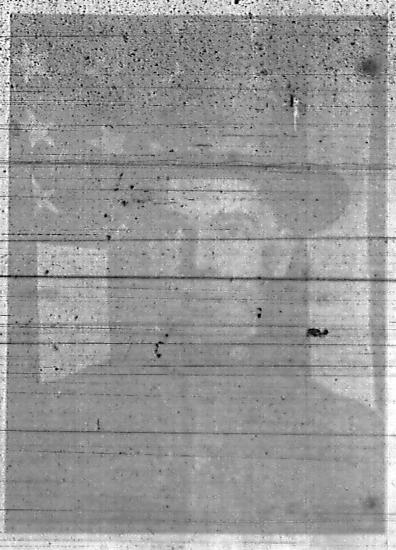
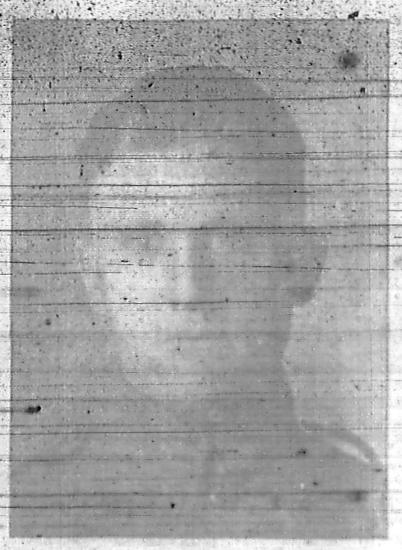
B. B. Ball, one of the most popular men in town and who had carried the mail between the post office and railroad for several years had resigned and the mail would be carried by Pate Swearingen.
Bert T. Quick, son of F. G. Quick, arrived overseas safely. He had been promoted several times. And relatives of Mr. Walter Cundiff received word that he had arrived safe in France and doing his part. He was a brother of Ben Cundiff of Bardstown Junction.
Stoney Weller of Shepherdsville wanted to buy one good "suckling mare mule."
Brother Wilhoit of the Mt. Washington Baptist Church delivered the dedicatory sermon for the dedication of the Victory Church. Miss Rouse played the violin.
Clarence Holsclaw and Charles Shoptaw reported the woods were full of squirrels and they were ruining the corn crops. Hunters could certainly square themselves with the hill farmers by going out and slaughtering a few hundred squirrels, and it could be done, as they were as thick as reported.
It was reported that Leslie Herps, who was at the Great Lakes Training Camp was very low with the Spanish Flu. He was one of the lucky few who survived it.
L. M. Barrall and daughter, Josie, were with their cousin, R. C. Bagby and family near Louisville, having been called there by the death of Richard Bagby Jr. in Philadelphia. He was training for service with the Marine Corps, having volunteered nine months earlier. Spanish influenza caused his death. It would take many more.
Mrs. Mack Jones received a card stating the ship on which her son, Paul Jones sailed had arrived safely overseas with the 22nd Engineers.
Rev. C. J. Oleander, the new pastor at Little Flock, was holding a series of meetings at the church.
J. R. Holsclaw sold two milk cows and calves to Andy Kulmer for $165.00.
Cristian Schaefer received a telegram stating that his son, Oscar Schaefer, was killed on August 28, somewhere in France.
The State Board of Health ordered all schools, churches, and other like places to be closed in an effort to combat the spread of the Spanish Influenza.
The many friends of Rev. Cunningham were delighted to welcome him back to Hebron, if only for a brief time.
Ed Raiser was found dead lying by the side of the road, near Smithville, Tuesday morning by Ike Boston and several others. Raiser was well known in that neighborhood where he had been working. Dr. J. H. Shafer was called and held an inquest.
Troutman Bros. bought a new Ford Auto Delivery Truck.
And F. G. Thomas finished beautifying the residence of Mr. J. C. Holsclaw and left there to paint Mr. Price Smith’s residence.
With the Spanish influenza spreading across the nation, the paper was filled with obituaries of local folks including the following:
Miss Teresa Brooks, aged 75, youngest daughter of David Brooks; William H. Cooper died of cancer at the age of 52; Hallie Roby, wife of Mack Roby, died in Louisville at the hospital; Clarence Greenwell, a railroad engineer living in Lebanon Junction, was stricken with the flu and died; Mrs. Maggie Harris, wife of James Harris, died of the flu and pneumonia; Mrs. Martha Compton, aged about 66 years, died at her home in Belmont, Oct. 22, after only a short illness of pneumonia; and little Myrtle Virginia Greenwell, two years and eight days old, was a victim of the flu. There would be many others.
Meanwhile, Mr. and Mrs. C. F. Troutman received a telegram from Washington stating that their eldest son, David Millard Troutman, lost his life on the field of battle in France, on the 4th day of October.
The death reports continued. While William Johnson Jr. was at Camp Knox, his wife died of the flu. Ellis Jasper died of uremic poisoning. Then Abner and Robert Priddy were working at Camp Knox when they became infected. They returned home, bringing the infection with them. In the end both boys and their father Henry died from the flu.
Other deaths attributed to the Spanish flu included William Harvey McCubbins, Katie Raley Engle, Annie Dobson Hays, John Buky, Elrod Baker and L. P. Hibbs.
Near the end of the month, reports were received that Charles Milam, Elmer Monroe and Horrie Thompson had all been killed in action in France.
In other news, Al Miller sold the Zoneton Mill to Messrs. Bridwell and Pearl, who removed it to Shepherdsville and erected a garage. This removed a landmark which would be missed. The original Mill was built by Mr. Peter Smith, of Pennsylvania, grandfather of W. H. and John Smith here. He also had an oven built and made sea biscuits which he took to New Orleans by way of flat boat, starting down Floyd’s Fork, near the old Kirk or Brown farm, the then-present farm of John Crumbacker, who owned and operated the Mill for many years. What a history it could have told.
Mr. W. C. Wade had a Jersey cow die, and Dr. Smith was called. He had her skinned and cut open, and on examination, he found a piece of wire run through her heart and also a long black headed pin.
And on a lighter note, there was a break-in at Patterson's store, but the intruders were soon apprehended. George Bowman, clerk at the store, discovered the break-in when he arrived at work. The man and woman responsible were captured with most of the stolen property. We won't name the culprits, but the paper editor remarked that Jailor Monroe had a real, live, female Fox to feed in his stone cage.
The December news included the usual Letters to Santa, and an assortment of local news such as a report that a group of teachers had met at Leaches on a Saturday. They included Alleen Swearingen, Edyth Clark, Neva Magruder, Hallie Magruder, Elizabeth Weller and Ora L. Roby.
In other news, Arthur Newman took a truck load of very fine porkers to the city and brought back the price of a small farm. Arthur was one of the best young farmers in the county, keeping the best of stock and getting top prices for all that he sold.
Miss Gussie Quick and brother, Fred, had as their guests on a Sunday, Misses Willie Chickering, Christina Skinner, Minerva Pendleton, Lula Ashby and Margaret Hardesty, Messrs Robert Hardesty, Maurice Ridgway, Charles Ashby, Earl Armstrong, Russ Hedgepath and Rev. Hilery Burns.
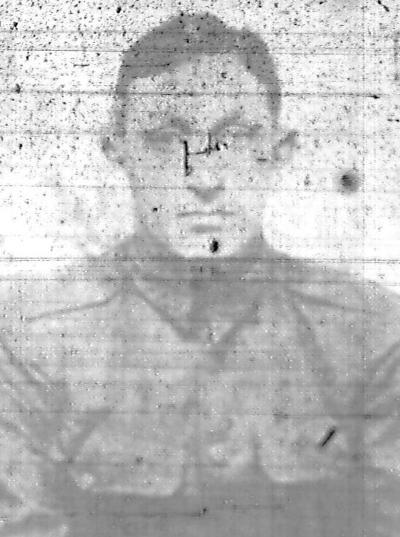
And the BYPU Program participants included Miss Martha Hornbeck, Margaret Sanders, Samuel Ridgway, Mayme Stephens, Thelma Daugherty, Blanch Howlett, Mrs. Glenn, Margaret Foster, Dorothy Samuels, and Lena Patterson.
But many social gatherings and functions were being postponed or cancelled because of the influenza epidemic sweeping the nation.
In Cupio news, Mrs. Ambrose Skinner received a letter from her son, Julius, who was in France, saying he was on a rest just back from a fight.
And Mr. and Mrs. William Wade had been officially notified that their son, John Lewis Wade, was seriously wounded in battle in France in October, and was then in a hospital in England.
The editor wrote the following: "The doctors inform us that there are about one thousand cases of influenza in the county, one tenth of the entire population. More than fifty deaths have resulted and the end is not yet in sight. So far as we have heard, Bullitt's loss on the fields of battle is not so great point of numbers - eight killed - while the number of boys who died of disease is about four - 12 in all. We have lost just four times as many here at home through the ravages of influenza as we lost on the battlefield and in the camp."
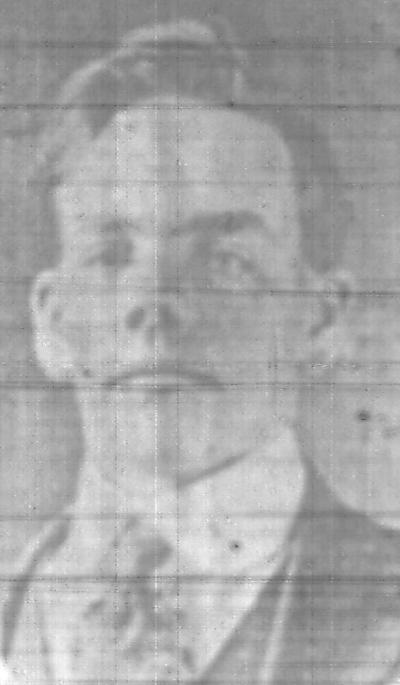
This continued to be the case, as the Board of Health closed all the schools, churches, and other meeting places in an attempt to slow down the spread of the disease. The papers during the month were filled with the names of those who had died, many of whom lost their lives to the flu.
Names of the dead that we gleaned from the paper included William Dawson, a farmer near Solitude, Horrie Columbus Thompson, who died in France; Lou Pearl Hibbs, stricken with flu in England; Bruce Bridwell, died of flu at Paris Island; Nora Thompson, wife of Elmer Thompson; Blanche Younger Armstrong, flu; Hazel Katherine Raney, infant daughter of E. D. Raney, flu; Elmer F. Monroe, from wounds suffered in October; Prudence Parris, flu; Mr. and Mrs. Everett Armstrong of near Mt. Washington, flu; Whitson Dillander, flu; Ben Bealmear; Mrs. Joseph Detritch; Rueben Hoagland Armstrong, four year old son of Mr. and Mrs. Albert Armstrong, flu; Claudie Anderson Snawder, aged 19 years, flu; B. Hamlet Croan, flu; Mrs. Jennie Patterson Brown; Curtis Wise of Lebanon Junction, Ky., killed in battle; Mrs. William Ladisaw, flu; and Herbert Gentry, flu. There were likely others as well.
For a second year in a row, Christmas would be a heartbreaking time for so many families.
Copyright 2026 by Charles Hartley, Shepherdsville KY. All rights are reserved. No part of the content of this page may be included in any format in any place without the written permission of the copyright holder.
The Bullitt County History Museum, a service of the Bullitt County Genealogical Society, is located in the county courthouse at 300 South Buckman Street (Highway 61) in Shepherdsville, Kentucky. The museum, along with its research room, is open 10 a.m. to 4 p.m. Monday through Friday. Saturday appointments are available by calling 502-921-0161 during our regular weekday hours. Admission is free. The museum, as part of the Bullitt County Genealogical Society, is a 501(c)3 tax exempt organization and is classified as a 509(a)2 public charity. Contributions and bequests are deductible under section 2055, 2106, or 2522 of the Internal Revenue Code. Page last modified: 05 Feb 2026 . Page URL: bullittcountyhistory.org/happened/1918.html